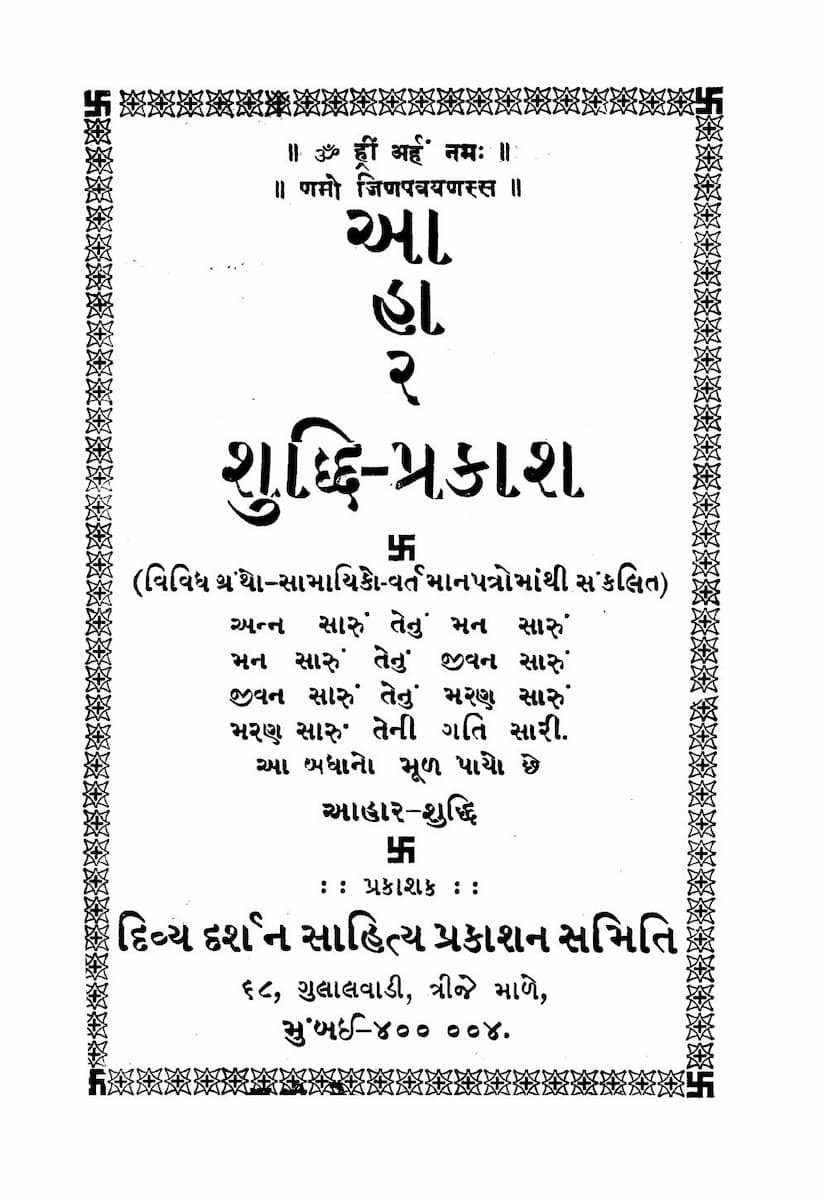Aahar Shuddhi Prakash
Added to library: September 1, 2025

Summary
"Aahar Shuddhi Prakash" (The Light of Food Purity), published by Divya Darshan Prakashan Samiti, is a Jain text that extensively discusses the principles of aharah shuddhi (purity of food) according to Jain philosophy. The book emphasizes that the foundation of a good mind, a good life, and ultimately a good destination after death lies in pure eating habits.
Key themes and concepts explored in the book include:
- The direct link between diet and well-being: The text posits a strong correlation between the food consumed, the state of one's mind, and the purity of one's soul. Pure food leads to a pure mind, which in turn leads to a virtuous life and a favorable afterlife.
- The importance of bhakshya (consumable) and abhakshya (non-consumable) items: Drawing upon the teachings of enlightened beings, the book meticulously details what is permissible (bhakshya) and what is forbidden (abhakshya) in Jain dietary practices. This distinction is not merely for religious observance but is presented as crucial for physical health, mental clarity, and spiritual progress.
- The impact of abhakshya on the soul and destiny: Consuming abhakshya items is explained to cause harm not only to health but also to the soul, leading to negative karmic consequences, cruelty, agitated thoughts, loss of peace, and a predisposition towards unfavorable rebirths. The text highlights the destruction of numerous lives in abhakshya foods like root vegetables, meat, and alcohol.
- The interconnectedness of body, mind, and soul: The book stresses that achieving spiritual goals (like moksha or liberation) is impossible without maintaining the purity of the body and mind, which is directly influenced by food. It argues that a pure diet is the foundation for controlling desires, developing self-discipline, and ultimately achieving the state of anahaari (one who does not need food).
- Detailed analysis of prohibited food items: The text elaborates on various categories of abhakshya items, including:
- Mahavigai (four major forbidden items): Honey, alcohol (madira), meat (mansa), and butter (makhan).
- Bahu-bij (many-seeded fruits): Such as guava, ber, jamun, brinjal, etc., due to the presence of numerous subtle lives.
- Anantkay (infinite-bodied items): Root vegetables like potatoes, onions, garlic, carrots, radishes, etc., which are considered to harbor countless microscopic lives.
- Other forbidden items: Including certain fruits, fermented foods, improperly prepared or stale food, and food prepared or consumed at night.
- Scientific and health perspectives: The book incorporates the views of Western scientists and doctors to support its arguments, presenting a blend of traditional Jain wisdom and modern scientific understanding regarding the impact of diet on health.
- The role of diet in character development: Aahar Shuddhi Prakash argues that dietary choices significantly influence a person's character, fostering virtues like non-violence, self-control, purity, and compassion when following a satvik (pure) diet, and leading to negative traits like anger, greed, and cruelty when consuming tamasic (impure) foods.
- Emphasis on tapa (austerity) and sanyam (restraint): The text advocates for tapa and sanyam as essential tools to conquer dietary desires and achieve spiritual liberation.
- Critique of modern dietary habits and the importance of conscious eating: It contrasts the simple, pure lifestyles of ancient times with the complex, often unhealthy, dietary practices of the modern era, urging readers to be mindful of their food choices and their consequences.
- Narratives and illustrations: To make the teachings more accessible and impactful, the book includes stories, anecdotes, and potentially visual aids to illustrate the principles discussed.
In essence, "Aahar Shuddhi Prakash" serves as a comprehensive guide for Jains, and anyone interested, on the vital role of pure food in achieving physical health, mental peace, and spiritual upliftment, urging a conscious and ethical approach to eating that aligns with the principles of ahimsa (non-violence) and self-control.